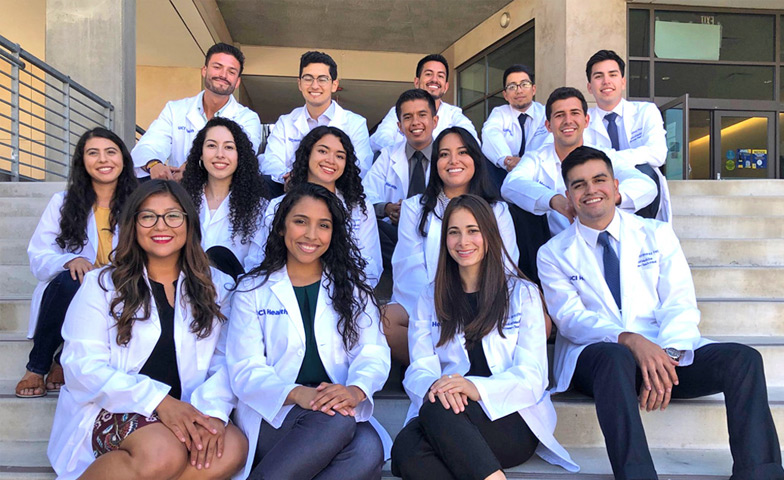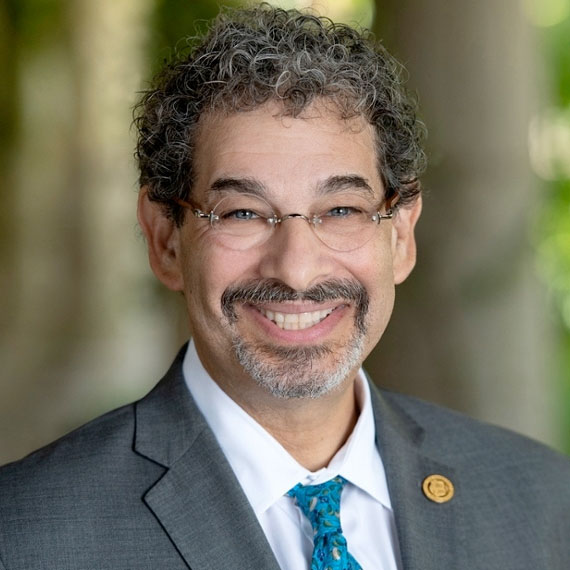Bridging the Gap Series : October 2021
Introduction from Vice Chancellor Steve Goldstein
As we come to the close of Hispanic Heritage Month, our attention to the health and wellness of the Latinx communities stays at the forefront of our efforts across UCI Health Affairs. These communities are underserved, and the work of the UCI Program in Medical Education for the Latinx Community (PRIME-LC) is helping to address this gap.
Led by Dr. Charles Vega, UC Irvine PRIME-LC program has served our Latinx communities and patients for decades, and knows what it means to provide community focused healthcare. PRIME-LC is designed specifically to educate healthcare practitioners to provide excellent healthcare to these communities and to advocate on behalf of their patients. Our graduates represent the Latinx community and know how to serve community members for improved health outcomes. For this work, I want to again applaud Dr. Vega, whose numerous awards for teaching and physician excellence year after year are amplified in 2021 by national recognition as one of the Top 25 Diversity Leaders in Healthcare by Modern Healthcare.
In this essay, part of the UCI Health Affairs Bridging the Gap series where we focus on health equity in the context of diversity, equity, and inclusion, Dr. Vega illustrates why PRIME-LC is an exemplary model of addressing healthcare disparities in our Latinx community. Designing, building, and launching a healthcare workforce to serve our Latinx community directly is one manifestation of our Discover. Teach. Heal mission, ensuring that a diverse healthcare workforce is trained to offer the Latinx community support for wellness and the best in healthcare when they are unwell.
By Dr. Charles Vega
There are many Latinx communities in need of better healthcare. This doesn’t just mean access to quality care. It means healthcare that is designed to serve the Latinx community and create a new generation of healthcare-activists who not only provide the best medicine for the Latinx community but who work on the upstream social determinants of health which result in health disparities for Latinx communities. The role of UCI’s PRIME-LC program is to shape the healthcare workers who will serve this community. The practitioners who graduate from our program are trained to know the community in which they are practicing and to learn about their patients, not just treat them.
We are creating a healthcare workforce that is deeply connected and committed to these communities, and that knows just how to provide healthcare for them in a way that leads to better health outcomes. Community care is not just our mission, it is our passion. We see ourselves, our friends and family members in our patients. Their long-term wellness is a personal goal for us, not just a professional one.
Investing in Community Focused Healthcare Matters
The program fills an important but underestimated gap in the field of medicine; it connects communities to their healthcare services and professionals in a way that leads to improved quality of care and builds trust in medicine through an already established connection of shared backgrounds. In the region surrounding UCI, the Latinx community has the biggest population locally with the poorest health outcome. The social determinants of health in these communities are some of the worst in Orange County, California.
The pathology in these communities is staggering, and it is compounded by a lack of trust in the healthcare system. Latinx patients grow more ill instead of receiving the treatment they need. Having a trusting relationship with the healthcare provider allows patients to feel more comfortable disclosing personal information about their health and working in partnership with their physician, which equals a faster and more accurate diagnosis for better treatment options.
Building Trust Leads to Improved Wellness
In my experience there is an immeasurable value in community care. I have patients now who I have been caring for since my intern year in 1996. The continuity of care that I have with these patients means that I not only am able to treat based on symptomology and a medical record, it means that I know these patients and I know their medical and personal history. I know how they react to treatment, what works and what doesn’t. The relationship goes both ways. My patients know that I have their confidence, that I will do everything I can to give them the best treatment possible and that they can trust me.
The COVID-19 pandemic has laid bare many of the health disparities we have witnessed in Santa Ana for decades. Despite high rates of infection among the many poor frontline workers in our community, many could not or would not receive COVID-19 vaccinations at large mass vaccination events. Through a relationship built on trust and respect, our UCI Family Health Center in Santa Ana has put nearly 30,000 shots in arms at our center alone. This remarkable achievement highlights the power of culturally- and community-centered health.
On a more personal level, I have been blessed to be invited into patients’ homes and into their lives. This connection always helps you learn more about your patients and knowing your patient leads to better health outcomes. PRIME-LC places a real value in practicing medicine this way, and it does so by academic and systematic design. We built a curriculum that includes learning how to advocate effectively on behalf of a patient and how to communicate and integrate wellness into medical practice. Over time, our Latinx populations are going to have increasingly successful health outcomes. Our hope is to export this model of health training to other programs across the country as we continue to develop our track record of success.
Developing the Program
What does this mean for our students? It means that students who have traditionally been left out of the system can now thrive in a program specially designed to help them learn how to provide effective high-quality healthcare to communities that are close to their hearts. Our students have not only fluency in Spanish but more importantly they have cultural fluency. Many of our students have come from disadvantaged backgrounds themselves and seek to give back to communities like the ones they grew up in. They have natural leadership capacity to go out into their communities. They also contribute to building the program later on as alumni engaging new students as mentors. While it’s only a five-year program, we think of it as 30-year program, with network of students, physicians, and community members providing one another mutual support and opportunities.

The more physicians we can help shape within this model and the more healthcare workers we can graduate into the world who are passionate about community medicine, the more people in these communities will receive quality healthcare that they deserve. We are already realizing the power of PRIME-LC to shift the culture, as more patients are able to recognize themselves in the staff and healthcare providers and form effective partnerships.
I am passionate about our work and proud of all that our students continue to achieve with their patients. Community-based healthcare is a powerful elevator and is able to address social determinants of health in a way that turns lives around, it is fundamental in bridging the gap.
About PRIME LC
The program was developed in 2003. The program encompasses a five-year MD/Master’s program which focuses on medical training tailored to meet the needs of under-resourced and formerly medically underserved Latinx communities. The program provides a curriculum which integrates leadership, advocacy and service on top of the normal medical school program. The program admits around 12 Spanish speaking students each year, and these students go on to integrate themselves into Latinx communities in their practice of medicine.

Started in June 2020, Bridging the Gap is a series curated by Vice Chancellor Steve Goldstein, as a way to examine and share our work in closing all gaps to achieve health equity through awareness, understanding, compassion and action. You can also receive the series in your inbox by subscribing to the newsletter.
Category: Digital Publications